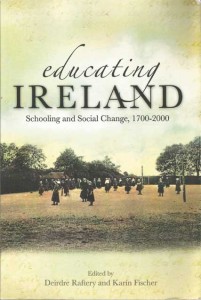Educating Ireland: schooling and social change, 1700–2000
Published in Book Reviews, Issue 2 (March/April 2016), Reviews, Volume 24DEIRDRE RAFTERY and KARIN FISCHER (eds)
Irish Academic Press
€22.45
ISBN 9780716532446
Reviewed by Colm Mac Gearailt

This book is not a survey of the education system as it progressed in Ireland. It offers instead vignettes of different areas of educational policy, both official and unofficial, from the seventeenth to the twentieth century, and their effects in shaping (and being shaped by) Irish society.
Part 1 begins with Antonia McManus’s chapter on Irish hedge schools (which illegally educated Catholics during the time of the penal laws and beyond) and their role in social change. McManus dispels many of the myths regarding hedge schoolmasters, notably, as nineteenth-century novelist William Carleton contended, that ‘there was scarcely a hedge schoolmaster in Ireland … who is not a ribbon-lodge master’. By using a variety of primary sources, such as diaries of leading police officers and reports from the Public Records Office, McManus establishes that only a negligible proportion of suspected Whiteboys and Ribbonmen were hedge schoolmasters, and that, despite being ‘of the people’, hedge schoolmasters were not by proxy criminal agitators. This chapter is counterbalanced by Christopher McCormack’s insightful discussion of the Endowed Schools Commission, which dealt with Superior Schooling, the Protestant schools tasked with educating the ‘masses’ in the aftermath of the plantations and land resettlements of the sixteenth and seventeenth centuries. Tony Lyons’s chapter on Thomas Wyse and his efforts to establish non-denominational education in Ireland in the mid-nineteenth century concludes this section.
Part 2 analyses female involvement in education in the nineteenth century. Eilís O’Sullivan provides an excellently accessible account of women and elementary education for the poor. Using key individuals as case-studies and discussing their participation in charities, especially in the area of education, she demonstrates how women were not to be solely confined to the domestic sphere. Catherine Nowlan-Roebuck’s chapter on the Presentation sisters provides an account not only of the key figures in establishing that order, and its general structures, but also of the everyday realities of these schools, looking at what and, importantly, how school subjects were taught. Deirdre Raftery’s study, the shortest of the book, makes use of the limited available sources to attempt to understand the role of governesses in female education in nineteenth-century Ireland, alongside their declining social status in Anglo-Irish society. While the image of the governess in popular fiction such as Bronte’s Jane Eyre does not differ altogether from the reality outlined, Raftery demonstrates how this fiction fails to adequately come to terms with the hardships faced, beyond the ‘plain, simple and austere’ demeanour generally considered. Clara Cullen’s chapter on the Museum of Irish Industry explores one institution specifically engaged with education that was outside the remit of the ‘state’, expanding the focus of the book to include the public realm.
Part 3 deals with twentieth-century Ireland. Martina Relihan analyses the engagement between the Church of Ireland and state authorities, outlining the Protestant minority position on the teaching of central elements in the Free State educational ‘Policy of Gaelicisation’: the Irish language and Irish history. The three chapters which follow (Brian McCarthy’s look at the modernisation of Garda recruitment policy, Marie Clarke’s analysis of the implementation of the greater schools cooperation policy in relation to vocational education, and Karin Fischer’s examination of education following the outbreak of the Northern Troubles) deal more with the interplay between society and education than do the book’s previous two parts.
The book is not without fault. The lack of an introductory chapter providing a thematic guide and brief synopsis of the various contributions adds to a sense of disconnection between the chapters. The book (with Fischer and Clarke as commendable exceptions) also tends to focus more on the history of education than on contextualising educational reform within wider social change, despite its subtitle. Elsewhere some arguments are overstated. McCormack’s claim that Endowed Schools Commissions, by mediating Superior Schooling to ensure consensus for colonial rule, in the aftermath of political shifts such as Catholic Emancipation (1829) and church disestablishment (1869) were responsible for ‘preventing the rupture of the political union of Great Britain and Ireland’ is a step too far. Lyons’s chapter on Wyse relies too heavily on secondary sources, despite Lyons’s own awareness of the outdated and limited scholarship on the topic. This piece could have been stronger had it also assessed Wyse’s career and legacy through his writings and speeches, thus giving a glimpse of the man himself. As it stands, Wyse the person gets lost behind the talk of others about him, while Lyons’s style of writing at times appears flowery and overemphasised. Other chapters are only tangentially linked to education, notably McCarthy’s chapter on Garda training policies. Training and education, though closely related, ought not to be conflated. A chapter of this sort would be better suited in a work on society at large rather than in one on education.
Overall, the editors have compiled a multifaceted and interesting book that offers insights into Irish education over three centuries without appearing simply descriptive or state-orientated. The use of new sources and methodological and theoretical frameworks means that material which might otherwise be considered ‘exhausted’ is seen in a fresh light, while other areas are investigated for the first time. Consequently this is a welcome addition to scholarship in the field of educational history.
Colm Mac Gearailt is a Ph.D student in Trinity College, Dublin.
















